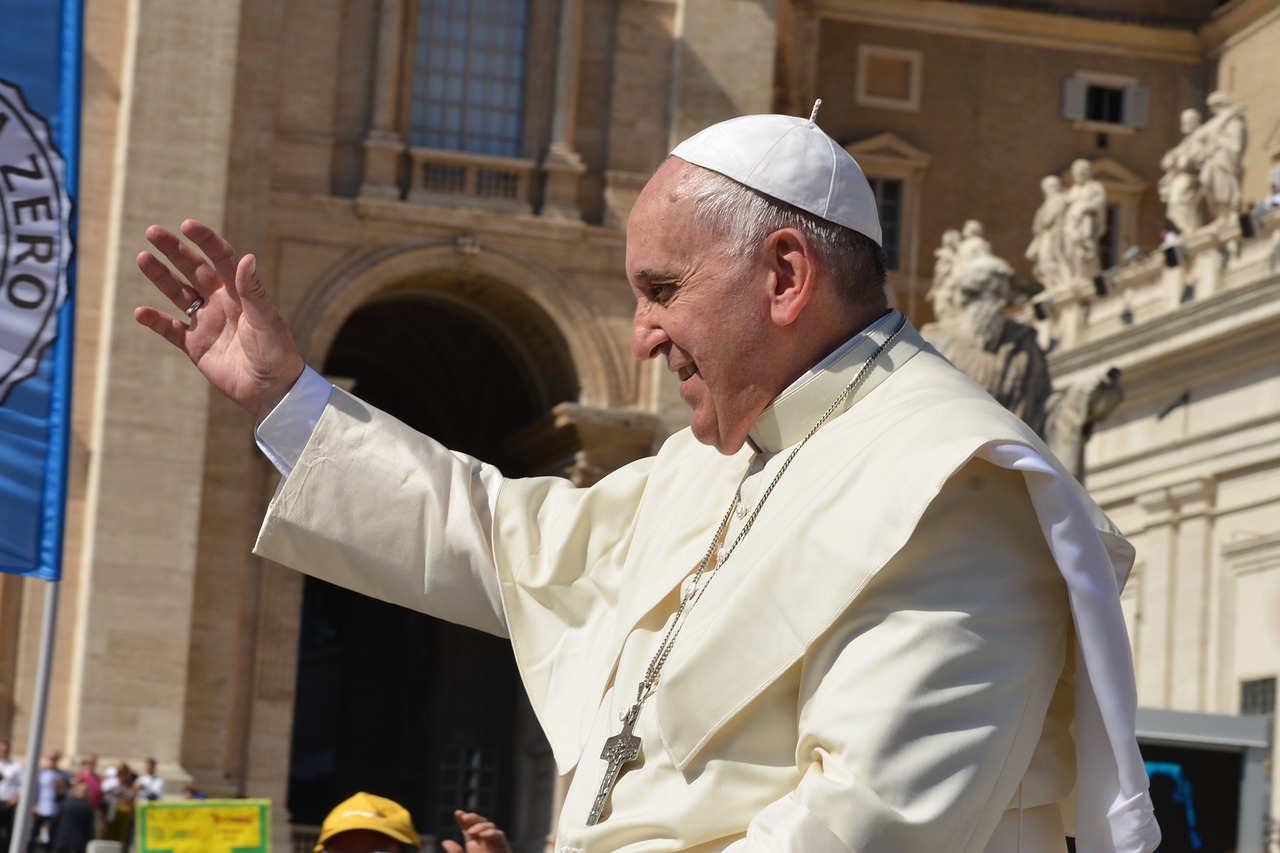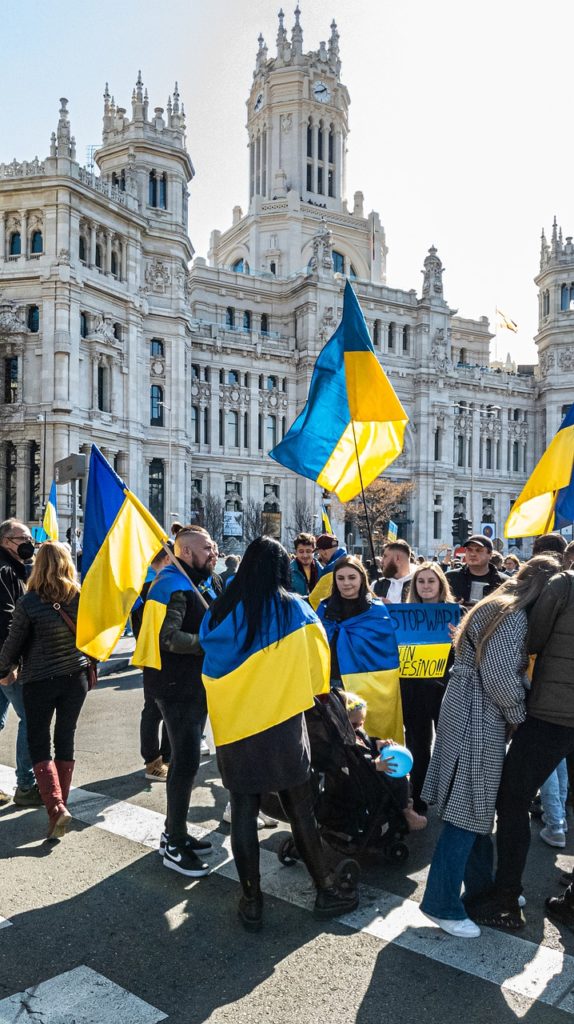
Pope Francis, Just War Theory, the Ukraine, and Beyond: Can War Be Just?
Charles Russo
Photo by Annett Klingner on Pixabay.
This article is part of our “Russia/Ukraine: Law and Religion Perspectives” series.
If you’d like to check out other articles in this series, click here.
“There is no such thing as a just war: they do not exist!”
In a speech at the Vatican Apostolic Palace on March 18, 2022, Pope Francis declared “war is always – always! – the defeat of humanity, always,” emphasizing there is no such thing as a just war. War is certainly a defeat for humanity despite Clausewitz’s dictum that “war is the continuation of politics by other means.” What is puzzling, though, is how the Pope, who in the same talk eloquently decried the horrors the unprovoked Russian attacks are inflicting on innocent non-combatants – wantonly bombing civilian targets, including schools, hospitals, and theaters in Ukraine – proclaimed that war could never be just. In doing so, the Pope repudiated centuries of Western Christian thought on the just war theory in his blanket condemnation of war – regardless of whether it repels unjust aggression, such as Russia’s indiscriminate use of force against civilians in Ukraine. The Pope has since criticized Russia for its role in a “cruel and senseless war,” lamenting what he described as an “Easter of War” in his plea for peace during his Easter blessing to the world.

Given his pronouncement of March 18, in which he called for a truce on Palm Sunday, one must wonder what the Pope, who also uttered “[i]n the context caused by the war in Ukraine, the value of . . . promoting universal brotherhood in the one human family, based on love, stands out even more,” would have said about World War II and the fight against the Nazis. A strong case can be made that Francis’ predecessor, Saint Pope John Paul II, a member of Poland’s heroic underground resistance during World War II, would have disagreed significantly, if not vociferously, with Francis’ observation.
It is disappointing that the Pope, who often “shoots from the hip” such as when, for example, he criticized capitalism, rejected the just war theory in his seemingly naïve, if utopian, words. The just war theory, or jus gentium, emerged in the writings of such monumental Christian thinkers as Augustine of Hippo and Thomas Aquinas along with the humanist Hugo Grotius, regarded as a founder of international law.
However well intended his sentiment, the Pope should have chosen his words more carefully, because in decrying war, he proved himself to be seemingly oblivious to language in The Catechism of the Catholic Church stating the contrary. While Section 2308 of The Catechism teaches that “[a]ll citizens and governments are obliged to work for the avoidance of war,” it next identifies “the traditional elements enumerated in what is called the ‘just war’ doctrine” which set “strict conditions for legitimate defense by military force.” Section 2309 specifies that “the damage inflicted by the aggressor on the nation or community of nations must be lasting, grave, and certain; all other means of putting an end to it must have been shown to be impractical or ineffective; there must be serious prospects of success; [and] the use of arms must not produce evils and disorders graver than the evil to be eliminated.”
Even conceding the Pope’s good faith in his March 18 ruminations, this essay begs to differ with his categorical repudiation of the possibility of a just war. As such, these reflections begin by briefly reviewing classical just war theory as it developed in Western Christendom because one would expect it to be part of the Pope’s perspective as leader of the Catholic Church. This commentary then maintains that as much as leaders must strive to avoid armed conflict, there are times when war can, indeed, not only be just, but a moral obligation to protect innocent noncombatants while ensuring an equitable peace for humankind.
Initially, it is important to identify the two components to the just war theory: jus ad bellum and jus in bello. Jus ad bellum spells out the conditions under which states can justifiably use military force. As anomalous as it may sound, jus in bello establishes principles as to how state leaders can, or should, conduct wars in ethical manners under the rules of war. These twin dimensions of the just war theory involve three important points. The first principle is that the taking of innocent human life is wrong. The second element is that if individual states and/or alliances of nations are victims of unwarranted armed aggression, they not only have the right but the duty to protect their residents and territorial integrity, preferably via peaceful means. The third precept recognizes that on occasion, states and/or alliances must engage in the use of armed force to protect the innocent.
As Aquinas, arguably the most significant Christian philosopher on just war, wrote:“[i]n order for a war to be just, three things are necessary. First, the authority of the sovereign by whose command the war is to be waged. For it is not the business of a private individual to declare war, because he can seek for redress of his rights from the tribunal of his superior.”
“Secondly, a just cause is required, namely that those who are attacked, should be attacked because they deserve it on account of some fault.” Relying on Augustine, Aquinas pointed out that “[a] just war is wont to be described as one that avenges wrongs, when a nation or state has to be punished, for refusing to make amends for the wrongs inflicted by its subjects, or to restore what it has seized unjustly.”
“As much as leaders must strive to avoid armed conflict, there are times when war can, indeed, not only be just, but a moral obligation to protect innocent noncombatants while ensuring an equitable peace for humankind.”
“Thirdly, [Aquinas considered] it is necessary that the belligerents should have a rightful intention, so that they intend the advancement of good, or the avoidance of evil. … For it may happen that the war is declared by the legitimate authority, and for a just cause, and yet be rendered unlawful through a wicked intention….”
Having enunciated his three criteria, Aquinas dismissed the objection that war is always a sin, responding that “[t]hose who wage war justly aim at peace, and so they are not opposed to peace, except to the evil peace, which Our Lord “came not to send upon earth” (Matthew 10.36).” Again citing Augustine, Aquinas wrote that “[w]e do not seek peace in order to be at war, but we go to war that we may have peace. Be peaceful, therefore, in warring, so that you may vanquish those whom you war against, and bring them to the prosperity of peace.”
Aquinas’ three just war criteria have since been expanded to six conditions. Consistent with these elements, partially included in the Catechism, the force must be proportionate to the harm suffered, all peaceful means of avoiding war must have been exhausted, and there must be a reasonable hope of success.
As applied to Russian activity in Ukraine, Pope Francis overlooked both long-standing Catholic/Christian thought and key principles in the United Nations Charter. For example, pursuant to Article 2(3-4)) of the Charter,
3. All Members shall settle their international disputes by peaceful means in such a manner that international peace and security, and justice, are not endangered.
4. All Members shall refrain in their international relations from the threat or use of force against the territorial integrity or political independence of any state, or in any other manner inconsistent with the Purposes of the United Nations.
Critiquing Pope Francis’ address in light of the principles of just war, a position he presaged in his 2020 encyclical Fratelli Tutti, one important caveat must be made clear. The United States and/or NATO should not engage in what would likely be a devastating all-out war with a nuclear-armed Russia over Ukraine as such a fight would put the survival of humankind at risk. Rather, this commentary hopes that with prudent leadership, this tragedy in Ukraine can be resolved peacefully, without war, avoiding further unnecessary death, destruction, and the accompanying refugee crisis this military action has created – one of the worst in recent history.
Briefly applying the first three of the six elements of just war theory to Ukraine, and avoiding geopolitical issues about the legitimacy of Putin’s basis for power, we might say that Putin’s authority to wage a pre-emptive war of aggression against a peaceful neighbor is at best highly doubtful. At the same time, Putin had neither just cause to initiate the unprovoked invasion of his peaceful neighbor nor a rightful intent in response to the actions of the government of Ukraine, an independent republic, as it considered exercising its legitimate right of self-determination by possibly applying for membership in NATO.
Turning to the next three elements, based on the horrific massive destruction and rising deaths of innocent civilians, especially women and children as well as those serving in the military, the force Russia uses against Ukraine is disproportionate as it attacks targets lacking military value, possibly resulting in war crimes in Ukraine. Moreover, Putin refused to conduct talks to exhaust peaceful means of resolving the conflict as he continues to issue ultimatums. Finally, given how the fighting has unfolded, Putin was apparently mistaken in believing that Russian forces had reasonable hopes for success. Based on the preceding, even if one gives the Pope the benefit of the doubt by believing he spoke with good intentions, it is unclear how, his desire for peace notwithstanding, he could reject the notion of a just war. One has but to look at what happened in World War II to acknowledge that as unwelcome as they are, sometimes wars can be essential to prevent even greater evils. While not equating the depravity of the atrocities the Nazis inflicted on millions to events in Ukraine, the prescient remark attributed to Edmund Burke, 18th-century Irish-British statesman, comes to mind: “[t]he only thing necessary for the triumph of evil is for good men to do nothing.” One hopes that Pope Francis, an arguably well-meaning, idealistic messenger of peace who condemns the horrors in Ukraine, will realize that war, as unwanted as it may be, can be the lesser of two evils in attempting to prevent more egregious injustices and human tragedies from occurring. ♦

Charles J. Russo, M.Div., J.D., Ed.D. is the Joseph Panzer Chair of Education in the School of Education and Health Sciences (SEHS), Director of SEHS’s Ph.D. Program in Educational Leadership, and Research Professor of Law in the School of Law at the University of Dayton, OH. He is also an Adjunct Professor at Notre Dame University of Australia School of Law, Sydney Campus.
Recommended Citation
Russo, Charles J. “Pope Francis, Just War Theory, the Ukraine, and Beyond: Can War Be Just?” Canopy Forum, May 4, 2022. https://canopyforum.org/2021/05/04/pope-francis-just-war-theory-the-ukraine-and-beyond-can-war-be-just/.

